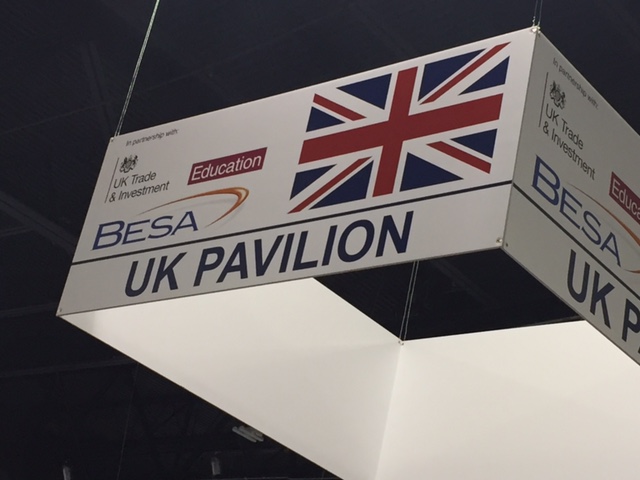British Companies Reach Out to U.S. Ed-Tech Market at ISTE, as Brexit Questions Remain

Denver
As the the biggest and most confusing economic story in the world churns in the United Kingdom, several British-based education companies are trying clear through the mess to win over buyers and partners at the ISTE conference.
Britain’s vote to abandon the European Union—a decision known as the “Brexit”—has rattled world markets (though they have rebounded somewhat since the initial shock), produced a political standoff within the U.K., and led to a stare-down between leaders of the the nation and Europe.
At ISTE, a number of leaders of the U.K. education companies said the immediate fallout from Brexit brings uncertainty—about future trade agreements, relations with European buyers, the condition of British currency, and how those issues could affect their work in foreign markets.
At the same time, most of the company officials and association representatives at ISTE seemed cautiously optimistic that the current turmoil will subside and not pose an enduring threat to their businesses.
“At the moment, everybody’s a bit panicky, but we feel that in the future, it’s business as usual,” said William Prieto-Parra, the international manager for the British Educational Suppliers Association, which has more than 300 members.
Prieto-Parra, like some of the company officials his organization represents, says that British education businesses will continue to have steady business selling in the U.K., though a number of company officials said that market is oversaturated.
Even if the Brexit brings changes, “I don’t think any government, anywhere in the world, is going to move away from investing in education,” he said of the United Kingdom.
One of the biggest questions for British ed companies comes if the Brexit leads to a broad set of trade renegotiations between the U.K. and foreign countries. New deals could lead to different taxes or tariffs, Prieto-Parra said, but as with so many aspects of the Brexit, no one knows how it will play out.
Toby Sutton, the CEO of Scanning Pens, a company that sells a mobile scanner for students to help students with reading disabilities, said he sees potential benefits for his company, and for the U.K., in the Brexit.
The break from the EU could act as a “catalyst” for the U.K., to work out favorable trade deals, Sutton said. Britain is the world’s 5th-largest economy, and it will have the flexibility to negotiate deals to its liking, rather than accommodating the needs of the entire EU, some believe.
As a business, “I’m not bothered by Brexit in the slightest,” Sutton said.
Economic Liberty, or Isolation?
He hopes the EU exit could lead to a reduction in regulations that he says have squandered his company’s time, such as those related to the use of batteries for its product.
Others did not view the break with the EU as positively. Mark Chambers, the CEO of Naace, the Education Technology Association, based in Nottingham, said he worried about his members losing access to business protections that EU membership affords.
He cited low roaming charges as one example of an EU privilege his 2,000 paying members want to protect.
More broadly, his organization has a lot of partnerships with ed companies based in EU countries that Chambers said he does not want to see unravel.
He believes the United Kingdom has invested wisely in ed-tech in its schools in recent years. But “there is a danger in isolation,” Chambers argued. “If we’re withdrawing and becoming more insular, it doesn’t help us become more innovative.”
Neil Andrew, the managing director for the United States and international markets for U.K.-based Crick Software Ltd., said one of the most obvious questions is how the Brexit would affect exchange rates, which impact his organization’s ability to succeed selling to foreign markets.
He also worried about the changeover affecting his company’s ability to sell into mainland Europe—though those countries have not been a huge market for Crick so far.
“We would have preferred not to have exited,” he said.
An image from the UK companies’ pavilion at the ISTE exhibit hall.
See also:
